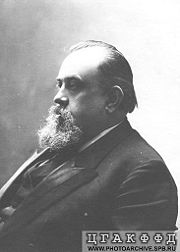
Maksim Kovalevsky
Encyclopedia

Sociology
Sociology is the study of society. It is a social science—a term with which it is sometimes synonymous—which uses various methods of empirical investigation and critical analysis to develop a body of knowledge about human social activity...
and professor
Professor
A professor is a scholarly teacher; the precise meaning of the term varies by country. Literally, professor derives from Latin as a "person who professes" being usually an expert in arts or sciences; a teacher of high rank...
of Legal History at the University of St Petersburg.
He studied at the University of Kharkov under Dmitri Kachanovsky.
He was at the University of Moscow from 1878 to 1887, where he studied legal institutions of Caucasian highlanders. Later he settled abroad, becoming friends with Karl Marx
Karl Marx
Karl Heinrich Marx was a German philosopher, economist, sociologist, historian, journalist, and revolutionary socialist. His ideas played a significant role in the development of social science and the socialist political movement...
and Frederick Engels.
In 1906 he founded the Progressist Party
Progressist Party
The Progressist Party was a group of moderate Russian liberals organized in 1908; it had 28 deputies in the Third Duma and 48 in the Fourth. Its most prominent members were Ivan Nikolaevich Efremov, Alexander Konovalov, and Pavel Ryabushinsky...
. He was a member of the State Duma
State Duma
The State Duma , common abbreviation: Госду́ма ) in the Russian Federation is the lower house of the Federal Assembly of Russia , the upper house being the Federation Council of Russia. The Duma headquarters is located in central Moscow, a few steps from Manege Square. Its members are referred to...
up to 1907, when he was elected to the State Council
State Council of Imperial Russia
The State Council was the supreme state advisory body to the Tsar in Imperial Russia.-18th century:Early Tsars' Councils were small and dealt primarily with the external politics....
by the academy of sciences and universities. In 1912 he was nominated for a Nobel peace prize
Nobel Peace Prize
The Nobel Peace Prize is one of the five Nobel Prizes bequeathed by the Swedish industrialist and inventor Alfred Nobel.-Background:According to Nobel's will, the Peace Prize shall be awarded to the person who...
.
Contributions
Among his contributions to Russian jurisprudence and social science was a new historical method which combined traditional descriptive comparative analysis with sociological/ethnographic methods.External links
- M.M. Kovalevsky, Obituary, 1 Russian Review 259-268 (available at http://books.google.com/books?id=uuoEAAAAYAAJ&lpg=PA262&ots=08vJE1FKth&dq=D.I.%20Kachenovsky&pg=PA259-IA2#v=onepage&q=D.I.%20Kachenovsky&f=false)
- Modern Customs and Ancient Laws of Russia. Union, N.J.: Lawbook Exchange, 2000. ISBN 978-1584770176
- Russian Political Institutions: the Growth and Development of These Institutions from the Beginnings of Russian History to the Present Time. University of Chicago PressUniversity of Chicago PressThe University of Chicago Press is the largest university press in the United States. It is operated by the University of Chicago and publishes a wide variety of academic titles, including The Chicago Manual of Style, dozens of academic journals, including Critical Inquiry, and a wide array of...
(1902). - Alexander F. Tsvirkun History and Legal and political scientist. Kharkov 2007

